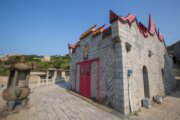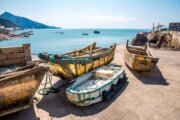aeeble
Houao Village
886-836-56531
連江縣北竿鄉后澳村
Timeless scenery rooted in a century of tradition
Houan Village is a typical coastal fishing village. If we start counting from Bashan Village, Houan is located at the very end of Beigan in the island's easternmost position, hence its name "Houan" (meaning "rear bay"). Strolling through the village, one encounters charming and rustic traditional settlements without excessive modern development. To the northwest lies "Aori" within Houan, a sheltered harbor facing northeast, serving as a common anchorage for fishing boats. During low tide, seawater recedes out to the harbor mouth, exposing a vast 4-5-hectare sandy beach.
Previously, to walk from Houan to Tangqi required wading through lengthy stretches of beach. Nowadays, a constructed road now connects Tangqi and Houan, greatly facilitating the villagers' travel. However, separated by the airport runway and Tanghou Beach, it still maintains a sense of seclusion from the bustling Tangqi.
Yang Gong Bashi Temple
The Village Guardian Deity
Within Houan lies the "Yang Gong Bashi Temple" with vibrant religious devotion. Villagers prepare grand ceremonies to worship the deity during annual festivals. It is believed that the principal deity, Yang Gong Bashi, sacrificed his life to extinguish the havoc wrought by a sea dragon causing torrential rains. Residents, who once offered care to his spirit, claim he frequently manifests to benefit the villagers. Subsequently, the community built this temple in commemoration of him, establishing it as the village guardian deity.
Must-Try Local Specialties of Matsu
Concentrated Ocean Flavors
Fish noodles are one of Matsu's finest culinary souvenirs to gift to others. As the name implies, they primarily use fish as raw material. The fish paste is combined with wheat starch and salt, kneaded into flat sheets, baked, refrigerated, cut into threads, and naturally sun-dried. The resulting noodles exhibit a chewy, Q texture bursting with local flavors. They are worth savoring firsthand.
Images
Ratings
Related Lists
🖼️


🖼️
🖼️
🖼️




Comments